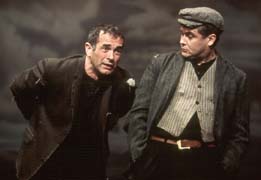
Theater Review
by Lucy Komisar

|
| STONES IN HIS POCKETS -- Sean Campion and Conleth Hill. Joan Marcus photo |
"Stones In His Pockets"
by Marie Jones, directed by Ian McElhinney
Produced by Paul Elliott, Adam Kenwright, Pat Moylan, Ed & David Mirvish,
and Azenberg/Pittelman
Golden Theatre, 252 W. 45 Street
212-239-6200, 800-432-7250
Opened April 1, 2001
Reviewed by Lucy Komisar April 17, 2001.
Jake (Conleth Hill) has lost his video store to corporate
competition, and Charlie (Sean Campion) is just back from New York,
where
the best he could do was bartend.
Their lives change when they meet movie star Caroline (Conleth Hill)
and her
director (Sean Campion) who've come to make a film in their small rural
village in County Kerry. One local who's seen it all before is Mickey
(Sean
Campion), famous as the only living extra from "The Quiet Man." And ...
well, you get the idea.
There are 15 characters in this movie-making epic, and the slightly scruffy Hill and Campion play them all -- terrifically. Ian McElhinney may not be directing a "cast of thousands," but with his deftly choreographed exits and entrances, you can hardly tell. This is more than a gimmick or a tour de force for two very talented Irish actors who are making their first visit to the United States. Marie Jones' play is a comic riff on the arrogance, self-delusions, hopes and dreams of the Americans who throw their weight around when they come to make a big-budget movie, and the local people who get caught up in the tinsel and glamour, but maybe teach the visitors a few things about values.
At first they're all trying to use each other, and it brings out everyone's dishonesty and tendency to manipulate. Caroline the movie star plays up to Charlie, hoping he'll improve her local dialect. Charlie, with no subtlety, asks how he can get into the movies and readily lies to get into her good graces. Jones does a wonderful take on the actress expressing scripted humanity when somebody dies. She also creates the archetypal sexually-harassing camera director who routinely gives fanny pats to the high-pitched "Ashley," supervisor of the extras.
Moving in front of a large backdrop of a giant color film negative of clouds in a blue sky, with no more set than a long line of shoes and a box on wheels that serves as a table, a coffin and a place to store costume changes, Hill and Campion draw on a rich jumble of voices, body language, gestures, and looks to create a remarkably engrossing and entertaining tale. [Komisar]

| museums | NYTW mail | recordings | coupons | publications | classified |